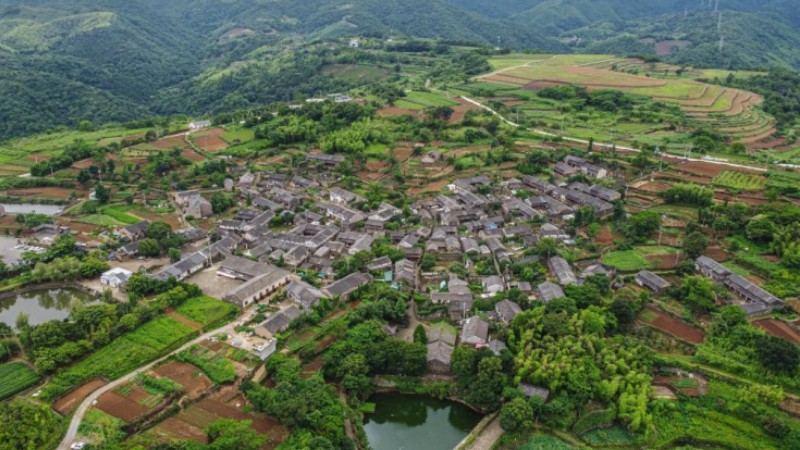Turning abandoned farmhouses into wealth
HEFEI, May 3 (Xinhua) -- During the May Day holiday, a homestay nestling in hills in Lujiang County, east China's Anhui Province, became a popular destination among holidaymakers.
Covering an area of 142 mu (about 9.47 hectares), the homestay was transformed from abandoned farmhouses and features clear brooks and lush trees. Tourists can enjoy coffee at a cowshed-turned-cafe and barbecue in what was once a shabby stone house.
"Many families enjoy a slow and idyllic life here. All 50 rooms had been booked up by mid-April," said Ma Fengyu, who is in charge of the homestay in Changchong Village, Wanshan Township.
The popular tourist destination was once a run-down area where 13 abandoned farmhouses were overgrown with weeds.
In 2018, the local government started to purchase the houses from local farmers and invited design teams to renovate them into a modern homestay, while seeking to preserve their original characteristics.
"We maintained the original natural scenery and the layout of those farmhouses. We also employ many local farmers as staff at the homestay," said Ma.
The homestay is a fine example of Lujiang's efforts to vitalize idle farmhouses over recent years. Currently, a total of 16 boutique homestays have been built and 34 more are under construction. Local farmers have also turned their idle houses into over 200 homestays and restaurants.
Many farmhouses have also been transformed into offices to meet the needs of companies seeking a more idyllic working environment.
Anhui Zhenwei Architecture Engineering Co., Ltd., for example, has established its branch office in a courtyard near a beautiful creek.
Zhenwei was one of the first enterprises to settle in Lujiang County after authorities last year began encouraging locals to renovate idle farmhouses into offices to attract businesses.
"The house has been completely renovated, and even equipped with cooking ware. We just need to bring our luggage to move in," said She Chengbing, a manager with Zhenwei. "The rural environment is great, and I feel relaxed working here."
The manager added that transportation to the county is also convenient, allowing his company to interact easily with businesses in neighboring regions.
To attract more enterprises, Lujiang County provides long-term free use of a renovated farmhouse for newly registered enterprises whose annual average tax payment reached a stipulated amount, said Wu Nana, deputy head of Wanshan Township.
"Our town has made 110 idle farmhouses available, and signed contracts with over 70 enterprises in various fields," said Wu, adding that more than 240 enterprises have settled in Lujiang.
After being renovated to create homestays or offices, these once idle farmhouses have become new resources and drivers of the local economy. At present, the program has increased the income of local village collectives by more than 20 million yuan (about 2.89 million U.S. dollars) a year, and created about 1,400 jobs for local villagers.
"We will continue to revitalize rural idle resources, in an effort to develop rural industry, utilize resources and promote local culture," said Su Rong, director of the culture and tourism bureau of Lujiang County.
Photos
Related Stories
- Village party secretary leads locals on journey to rural revitalization
- Village in E China's Jiangsu intensifies Party-building efforts to advance rural revitalization
- Mountainous village in E China's Anhui thrives on homestay business
- How rural revitalization is reshaping one Tibetan village
- Vibrant rural revitalization behind sweet ethnic Tajik wedding
Copyright © 2023 People's Daily Online. All Rights Reserved.









